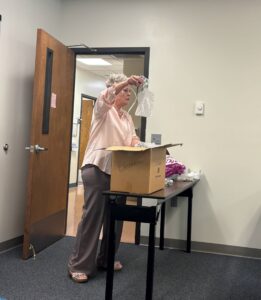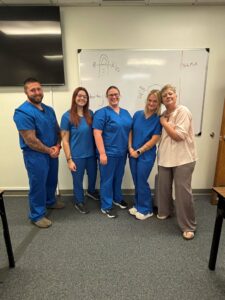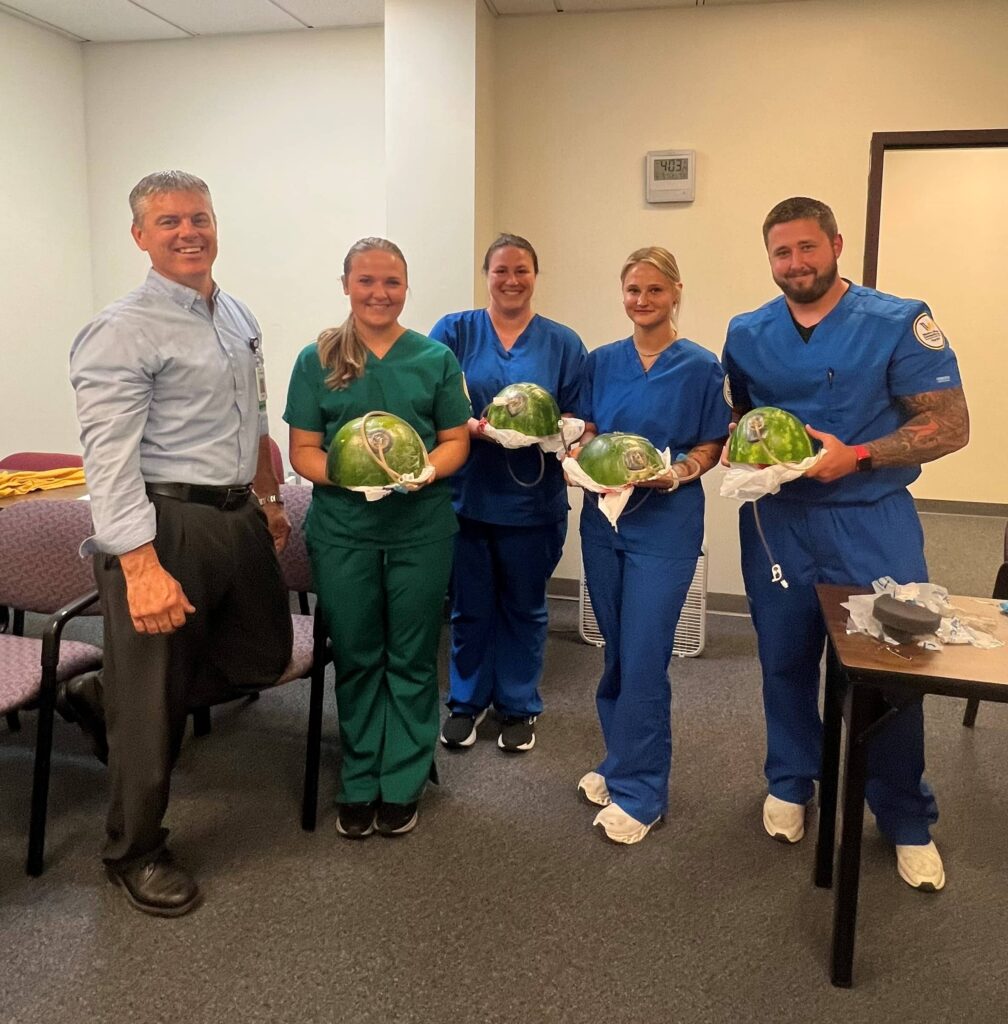The Nebraska Center for Nursing projects that Nebraska will experience a workforce shortage of 5,436 nurses by 2025. The shortage of nurses is primarily attributed to a limited supply of educators, an increasing number of nurses leaving the workforce, and a growing demand for healthcare services. The COVID-19 pandemic further intensified the nursing shortage. Insufficient nurse educators keeps nursing schools from being able to admit enough students to address the shortfall. Consequently, this shortage contributes to increased burnout among nurses, prompting them to consider leaving the field, which in turn continues the cycle of scarcity. According to the research done by the U.S. Bureau of Labor Statistics, Nebraska currently has 10.1 nurses per 1,000 population. Basically, only 10 people out of 1,000 become nurses. The population of Nebraska is roughly 1,967,923 people, yet only 19,870 residents are employed registered nurses. That means if the entire population of Nebraska was sick, each nurse would be in charge of about 99 individuals.
In Critical Access Hospitals, nurses deal with every type of care and treatment, as well as some clerical tasks, such as patient registration. As a result, Critical Access Hospitals must always have a certain number of staff on hand to be prepared for variations in demand. CAHs also need nurses who have a wider variety of skills. Did you know that the Panhandle and Sandhills Regions have the highest proportion of unmet demand for registered nurses? It is projected that by 2025, the Panhandle will experience an RN shortage of 146 full-time employees while the shortage for licensed practical nurses next year is anticipated to be 64 full-time employees. Basically, we need nurses, and we need nurses right here in Sidney who can join us full time. While we rely heavily on contract nurses to help us meet the demand, having local nurses who are invested in the community and well-being of SRMC are also essential.
Western Nebraska Community College is tackling this problem head on by providing an incredible nursing program right here in Sidney. Thanks to their efforts, we now have more nursing students on their way to becoming fully certified. Before they receive their degree, however, there is still much to learn. This is why SRMC has partnered with WNCC to assist with training nursing students in our community. Kelly Dean, RN, MSN, is the Nurse Instructor at Western Nebraska Community College, and she works hard to incorporate different guest speakers from the medical field to enhance her students’ learning experience. This year, SRMC worked with Kelly to arrange for six guest speakers to visit the WNCC classroom and share their expertise with the nursing students: Jessica Ernest, Ella Draper, Tyson Helm, and Alexandria (Alex) Jeppson.
Rehab & Wound Care
On August 28th, physical therapist and Rehabilitation Services Director Brad Kennedy visited the WNCC campus in Sidney to share his knowledge in physical therapy and wound care. Jessica, Ella, Tyson, and Alex spent two hours learning about assistive devices (crutches, canes, walkers, etc.), body mechanics, patient safety and assistance, and post-operative care considerations for spine and joint patients.
On September 5th, Brad returned and taught the students wound care principles such as negative pressure wound therapy. For this lesson, students were shown how to apply a wound vac dressing to a watermelon! This was a huge success, as the students learned how to troubleshoot to identify leaks and how to properly dress wounds. More importantly, the students learned how to take good care of patients and to collaborate with wound care specialists and other providers to make for a smooth and efficient care process.
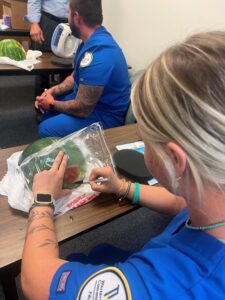
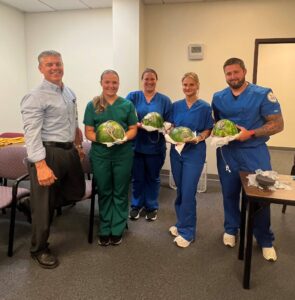
Lab & Phlebotomy
On September 11th, the students were able to learn about laboratory medicine from Lab Director Kalee Lipska and our Lab Manager and Medical Laboratory Scientist, Jeanny Escobar. For two hours, students were instructed on what tubes to use in what order, how to use them, different types of needles to use for different tests, how to feel for patient’s veins, and how to draw blood. Additionally, they explained the different ways to draw blood from patients whose veins are difficult to find and how to handle a variety of other sample types.
The students were instructed to check one another’s arms and hands to feel for veins rather than look for them and practiced tying tourniquets. Students felt for veins on dummy arms and drew fake blood from the dummy arms with Kalee and Jeanny’s expertise and supervision. It was a great day to practice and answer common questions about lab work!

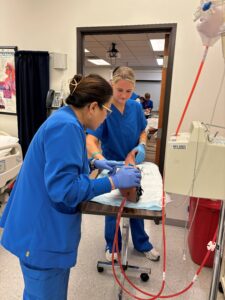
Nutrition & Cognition
On September 25th, Registered Dietitian Danielle Loomis instructed the WNCC students about the importance of nutrition and the different ways patients can receive nutrients. Together, Danielle and Speech-Language Pathologist Brenna Simmons, informed the class about the importance of properly chewing and swallowing food and drinks. Brenna discussed the cognition assessments she often utilizes, such as the SLUMS examination, and how to determine what types of foods a patient should be consuming by administering swallowing evaluations.
They emphasized the importance of charting how much food/liquid a patient is consuming, how often they use the restroom, and even what types of foods they eat. They explained that charting the amounts of fluid, sodium, protein, and calories may be necessary if a patient has diabetes or certain health issues; therefore, if charting is done incorrectly, the patient’s health can be adversely affected. This is why it is so important for nurses to watch for signs of malnutrition and routinely check on patients for diarrhea or severe vomiting. If problems like this continue for too long, it can lead to dehydration or even damage organs. Dietitian nutritionists and speech-language pathologists rely on accurate charting to determine how much nutrition support to provide and how to help patients who may be experiencing malnutrition, diarrhea, or severe vomiting. Ultimately, what nurses chart is essential to provide quality patient care and keep patients healthy.
Then, Brenna and Danielle explained how they utilize the International Dysphagia Diet Standardization Initiative (IDDSI) framework, which provides common terminology to describe food textures and drink thickness. To help the class understand the difference between the different textures, they brought samples! The four students were able to taste test food thickener, soft foods, and supplements. As nurses, they will be responsible for providing the proper foods to prevent laryngeal penetration, aspiration, or other respiratory complications, so it was good for them to experience the texture and taste themselves to better understand patients’ dislike or unwillingness to change their diet. The students bravely tried the samples and discovered that some weren’t that bad! Now they know what reaction to expect from future patients.
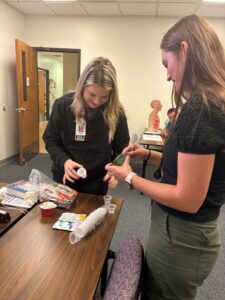
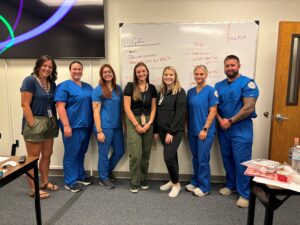
Respiratory Therapy
Shirley Wilson visited WNCC on September 26th to discuss respiratory therapy. Alex, Ella, Tyson, and Jessica learned the different ways to give supplemental oxygen and the diverse types of oxygen treatments and therapies. Shirley elaborated on hemoglobin, compensation, hypoxia, and carbon monoxide. She then explained the differences between a nasal cannula, simple mask, bi-level, and c-pap. Additionally, Shirley discussed Bernoulli’s principle, how to avoid common mistakes, and how respiratory therapy has changed over the years. There were good stories, plenty of laughs, and several lessons with Shirley!
The Western Nebraska Community College students are so appreciative and greatly benefited from these trainings. A special thank you to Kelly Dean for letting us share our knowledge with your incredible students!
The clinical partnership between SRMC and WNCC is so important to help these students learn and grow in their careers. After SRMC visits WNCC to meet the students and offer their specific expertise, the nursing students then go to SRMC for hands-on experience. This partnership is essential to achieve quality clinical experiences, reach outcomes, and ensure the students are able to achieve clinical judgment. This partnership benefits both organizations and will continue to produce top-notch nurses! To learn more, contact WNCC at (308) 254-5450.
